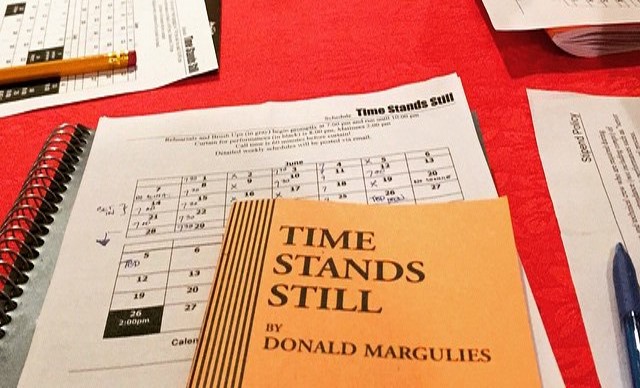So. Many. Lines. To. Remember.

I would say most theatre people would agree that every actor is keenly aware of how many lines they have when they are cast in a production. Some actors may even count them, which is no big challenge when you only need two hands to do so. Actors, by nature, love their stage time and the number of lines they have is a good gauge of how much time they will spend on stage. I would say that most of the characters I’ve portrayed, especially in plays, have been of the supporting variety and I firmly believe there are no small parts, only small actors. While I’ve had a decent amount of stage time over the years, much of my time has been spent backstage waiting for my cue. This, however, is not the case with my role in Time Stands Still. I haven’t even tried counting the lines, there are so many.
Regardless of whether your role is large or small, at some point, you need to commit those lines to memory. Only then, in my opinion, can you really start to live in the character and engage with what is going on around you in the onstage world you are creating. I believe that as a director. I am passionate about it as an actor.
Over the past few years, I’ve had a couple of friends who have made their return to the stage after a significant hiatus (meaning a decade or more off the boards). One common concern they all had was how difficult it would be to memorize the lines. As a woman in her mid-forties, I freely admit that my mind is not what it used to be. In my twenties, I was a quick study. However, with the passage of two decades and very little need to exercise the memory muscle, the lines don’t come to me quite as quickly.
Let’s just say that the role of Sarah in Times Stands Still pretty much requires me to flex that memory muscle. In fact, it’s like a Crossfit workout for my brain.
Holy. Crap.
Our director, Sonnie, is a stickler for precision when it comes to line memorization. As a writer and director, I have to say I wholeheartedly agree that exactitude is critical to a successful production. First and foremost, when a writer puts a line in a script, he puts it there for a reason. The words have been carefully chosen to accomplish the progression of plot or action, actors should not be permitted to purposefully change or add words to a script. The other reason it is important to be accurate with the words is that your line is a cue for something else – another actor’s line, a point of action or a tech cue depends on speaking the right line.
I would now like to draw your attention to Donald Margulies, the author of Time Stands Still. Mr. Margulies is a Pulitzer Prize winning playwright and Time Stands Still was a Tony nominated play. Believe me when I say the man has a way with words. He also has a way with the cadence and musicality of natural language, which includes a lot of interjected words. The writer in me loves this style but the actor in me is all the more challenged as I try to find not only the traditional cues but the cues where I interrupt or overlap with another actor’s lines.
As far as the lines are concerned, this show is definitely testing my memorization skills. Despite the time away from the stage, there are some habits you don’t forget. This process is a bit like learning to ride a bike. Once you learn, you never forget. Here are some tips that have helped me learn my lines over the years:
Read The Play
Sure, this seems like common sense but I cannot stress how important it is to read the play outside of the rehearsal space. When you are in rehearsal, you tend to be focused on acting, blocking and trying to get off book. Invariably, when I go back to the script, there is a parenthetical that I missed, a line that I memorized incorrectly or something I missed during scenes I’m not in. Being aware of the play in its entirety helps an actor to tell the story.
Highlight Your Lines
Invest in a new highlighter in your favorite color and highlight every line your character has in the play. Sometimes I will even highlight my action/blocking or, in the case of this play, the cue lines for the lines involving overlap or interruption. Doing so makes it a lot easier to find your place in the script during rehearsal and when working on memorization because it helps you to visualize the line on the page. I also go through with a pencil and indicate my cues, like so: Understand The Lines
Understand The Lines
Sometimes the lines are written in a way that doesn’t come naturally to you. Here is where I find it helpful to understand the primary purpose or theme of the line. Doing so can help you to remember the line’s context, which can help trigger the words in your muscle memory. For example, Sarah has a line in Times Stands Still where she says, “I live off the suffering of strangers.” For some reason, in rehearsal, I always have a hard time finding that line. So I’ve given myself to prompts to help remember the line: (1) Sarah’s previous line talks about killing which prompts me to think about suffering. (2) The line is a play on Blanche Dubois’ line in A Streetcar Named Desire, so I remind myself that the killing line is the prompt for the Blanche Dubois line. This is my own personal way of correlating the line, which helps me remember it.
Say The Lines Aloud (Over and Over Again)
While this is obviously something that is done at most rehearsals, it is critical that you find ways to say the lines out loud outside of rehearsal. The more opportunity you have to say the lines aloud, the more easily they will be embedded in your memory. If you can find someone to be on book and read the lines with you, that is the most helpful, it is even more helpful if that person can be a scene partner from the production. If you don’t have someone to read with you, I find an index card masking the cue lines to be a helpful alternative and one that I tend to use when I don’t want to be saying the lines out loud.
Make A Recording
When I was in college, back in the days of cassette tapes, I would record everyone’s lines into a tape recorder, pausing in the spots when my lines would be delivered. I would listen to them on my Walkman (gasp!) or play them on my stereo before I’d go to sleep (see Study Your Lines at Bedtime). While it is always better to have someone on book, this helps with listening for your cues and fitting your line into the flow of the dialogue. For Time Stands Still, the actor playing Jamie recorded the four of us reading the script allowed and the recording to CD for us. This has proven to be extremely helpful because we have the benefit of a “read aloud” tool but also the rhythms of how the actual actors in our production read the lines.
Listen
While much of line memorization is achieved by rote, it helps to pay attention to what else is going on in the scene. Very often the other lines and action in the scene can prompt you. Clearly, it is important to listen for the actual cue but participating in the scene and understanding the dialogue can also help you to remember your lines. Listening is also a building block for developing the scene and the character by requiring that you engage with what is going on around you.
Ignore Punctuation and Parentheticals
Sometimes an actor can get bogged down by the punctuation or described emotion that is attached to a line. Certainly some punctuation makes common sense but when you allow yourself to give the line different nuances, you make it your own. If the find yourself obsessing over every pause and exclamation point, you may lose an opportunity to bring new light to a line.
Study Your Lines at Bedtime
Studying before bedtime is another trick I discovered when I was in college. Gleaned from a proven study technique, research shows that if you read something before a good night’s sleep you will retain the information better. This is particularly effective is you are trying to learn new material. As you go through the line memorization process, especially early on, time spent with your script before falling asleep can help cement the lines in your memory.
Despite the many years that have passed since I’ve last had to remember a significant number of lines, line memorization is still a skill I’m pretty good at. We are meant to be off book for the entire show tomorrow night. While there are still those few pesky lines that don’t want to come, I am confident that very soon the lines will click and I can sink my teeth into character development.

